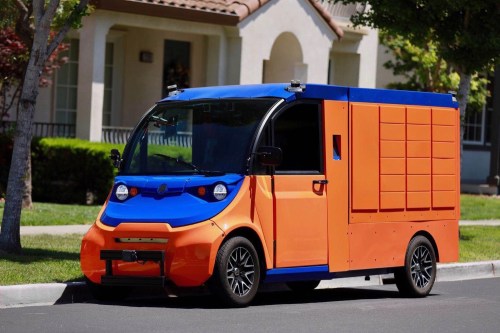
Future autonomous vehicles may spend more time carrying packages than people. Several companies, from large automakers to small startups, are experimenting with self-driving delivery vehicles. The latest is Boxbot, which was developed an autonomous electric vehicle for so-called “last-mile deliveries.” Boxbot’s pitch is certainly full of tech industry buzzwords, but will that equal success in the real world?
Boxbot was founded in 2016, and claims to have veterans of Uber and Tesla in its ranks. Its autonomous vehicle doesn’t appear that different from those of other startups, but that’s not the whole story. Boxbot views self-driving delivery vehicles as just one part of a larger network — one that will also include human-driven vehicles.
Just as large companies currently set up large distribution hubs at central locations, Boxbot plans to set up “automated local hubs” as home bases for its delivery vehicles. These hubs will be relatively small, and strategically placed near residential areas, according to Boxbot. That will make it easier for retailers to offer same-day or next-day shipping, and give customers more flexibility, according to Boxbot. The startup plans to let customers schedule deliveries whenever they want — even at night.
Both autonomous and human-driven vehicles will operate out of Boxbot’s hubs. The latter will be used for more expensive deliveries that require a signature, according to the startup.
Boxbot is partnering with logistics company OnTrac to test its self-driving vehicles in parts of Northern California this summer. Customers receiving packages through the pilot program will get a text message with a unique code in order to retrieve deliveries from lockers in the vehicles. One disadvantage of autonomous delivery vehicles is that no one is onboard to take packages directly to your door. Ford believes it may be able to solve that problem by equipping delivery vans with robots.
Several other companies are testing autonomous delivery vehicles. Startups Udelv and Nuro are running autonomous grocery-delivery pilot programs, while Ford has teamed up with Walmart to study the concept. These delivery services could allow companies to demonstrate the viability of autonomous vehicles without having to convince a skeptical public to ride in them, ultimately making it easier to roll out autonomous-driving tech on a large scale.
Editors' Recommendations
- Waymo robotaxi attacked and set on fire in San Francisco
- Cruise woes prompt production halt of fully driverless van
- Autonomous delivery robots at center of bomb scare ‘prank’
- Cruise autonomous vehicle drives over woman just after she was hit by another car
- Cruise says it’s nearing approval for mass production of futuristic robotaxi